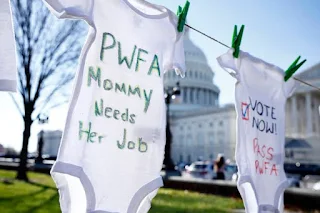The United States advocates for breastfeeding and gender equality.
Motherhood is incomplete without breastfeeding, which has more consequences than nutrition for a baby. While most countries have taken affirmative actions to foster breastfeeding as a way of promoting gender equity, the United States is equally adept at this endeavor. The complex relationship between breastfeeding, gender equity, and US policy approaches to promote both is reviewed in this article.
A new pathway for gender equality: breastfeeding.
It is often said that breastmilk is a mother’s most natural way to nourish and grow her baby, yet this is where it ends for most people. Intrinsically connected with gender equality as an engine in the process of women’s empowerment and society's advancement. Here are a few key aspects of this connection:
Economic Empowerment:
The participation of mothers in the workforce is enhanced when breastfeeding provides, as it does, a cheap and wholesome nutrient for the child. Breastfeeding mothers become economically empowered and independent when workplaces and communities offer the needed support for balancing their roles as professionals and parents.
Healthcare Equity:
Breastfeeding has a multitude of advantages for mothers’ as well as newborns’ health. In effect, society plays an important role in helping to propagate health equity, as breastfeeding support results in common health care benefits for each and every family, irrespective of social strata.
Education and Awareness:
Breastfeeding promotion supports an informed attitude towards women’s health, which is vital for society's development. The education campaigns of community initiatives aimed at destigmatization with regard to breastfeeding and providing space for mothers promote gender equality.
US initiatives for breastfeeding and gender equality
Breastfeeding as well as equality are of great importance to the United States of America. Therefore, the country has developed various measures as well as policies aimed at fostering those values. Here are a few notable efforts:
The Affordable Care Act (ACA):
Under the ACA, health insurance plans include breast pumping as well as lactation counseling, which should make it easier for mothers who are back at work to keep on breast-feeding their babies. This section makes a great step towards supporting breastfeeding and promoting gender equality in the workplace.
Paid Family Leave:
Some states in America passed a policy of paid family leaves that supported breast-feeding mothers so as to ensure an opportunity for the children and their mothers to bond together as well as ensure continued breastfeeding. The policies help women not to come back to work before time while contributing to the economic emancipation of women.
Business and Workplace Support:
It has come to the realization that most US businesses and employers are acknowledging the need to accommodate breastfeeding mothers. Lactation rooms, flexible schedules, and other resources geared toward helping mothers accomplish successful breastfeeding while juggling professional responsibilities
Community Awareness:
Various local and national events, such as the National Breastfeeding Month, seek to sensitize society to the need to help mothers breastfeed their babies. Such campaigns are aimed at breaking the taboo of breastfeeding and strengthening the equal position of women in society.
Access to Education:
Several breastfeeding educational initiatives are supported by the United States of America. These programs give women access to information and resources so that they can properly decide what to feed their babies.
Challenges and Future Directions
The United States has accomplished a lot when it comes to providing support for breast feeding and achieving gender equity, but challenges are also encountered.
For instance, social cultural barriers, the necessity of having nationwide legislation on paid family leaves, and inclusive social policies Going forward, more efforts should be directed towards creating conducive environments both at workplaces, health care centers, and communities for breastfeeding mothers.
As such, the United States can significantly contribute towards gender equality with a view to enhancing health services for both mothers and children. This commitment is not only about health and empowered people, but also their promise to the nation to achieve gender parity and improve society at large.



.jpeg)

.jpeg)
0 Comments